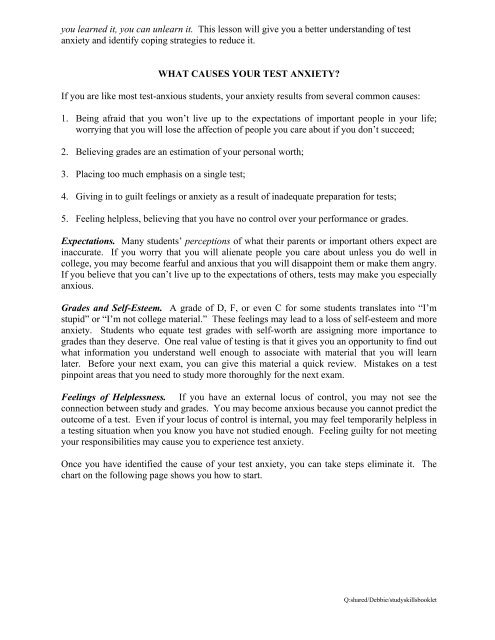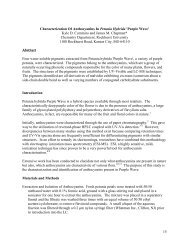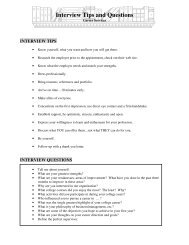NHTI Learning Center Test Anxiety Self-Assessment
NHTI Learning Center Test Anxiety Self-Assessment
NHTI Learning Center Test Anxiety Self-Assessment
You also want an ePaper? Increase the reach of your titles
YUMPU automatically turns print PDFs into web optimized ePapers that Google loves.
you learned it, you can unlearn it. This lesson will give you a better understanding of testanxiety and identify coping strategies to reduce it.WHAT CAUSES YOUR TEST ANXIETY?If you are like most test-anxious students, your anxiety results from several common causes:1. Being afraid that you won‘t live up to the expectations of important people in your life;worrying that you will lose the affection of people you care about if you don‘t succeed;2. Believing grades are an estimation of your personal worth;3. Placing too much emphasis on a single test;4. Giving in to guilt feelings or anxiety as a result of inadequate preparation for tests;5. Feeling helpless, believing that you have no control over your performance or grades.Expectations. Many students‘ perceptions of what their parents or important others expect areinaccurate. If you worry that you will alienate people you care about unless you do well incollege, you may become fearful and anxious that you will disappoint them or make them angry.If you believe that you can‘t live up to the expectations of others, tests may make you especiallyanxious.Grades and <strong>Self</strong>-Esteem. A grade of D, F, or even C for some students translates into —I‘mstupid“ or —I‘m not college material.“ These feelings may lead to a loss of self-esteem and moreanxiety. Students who equate test grades with self-worth are assigning more importance togrades than they deserve. One real value of testing is that it gives you an opportunity to find outwhat information you understand well enough to associate with material that you will learnlater. Before your next exam, you can give this material a quick review. Mistakes on a testpinpoint areas that you need to study more thoroughly for the next exam.Feelings of Helplessness. If you have an external locus of control, you may not see theconnection between study and grades. You may become anxious because you cannot predict theoutcome of a test. Even if your locus of control is internal, you may feel temporarily helpless ina testing situation when you know you have not studied enough. Feeling guilty for not meetingyour responsibilities may cause you to experience test anxiety.Once you have identified the cause of your test anxiety, you can take steps eliminate it. Thechart on the following page shows you how to start.Q:shared/Debbie/studyskillsbooklet
















